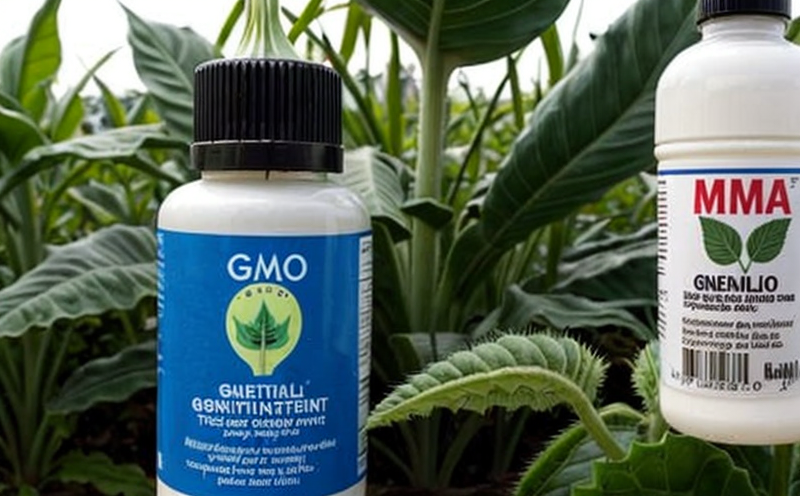ISO 40839 GMO Profiling in Organic Food Products
The ISO 40839 standard provides a comprehensive framework for the detection, identification, and quantification of genetically modified organisms (GMOs) in food products. This service is particularly relevant to organic food producers who must ensure that their products are free from unintended GMO contamination. By adhering to this international standard, laboratories can provide robust testing services tailored to meet the stringent requirements of the organic sector.
The process begins with thorough sample preparation, ensuring that all components of the food product are accurately represented in the test specimen. This involves careful extraction and purification techniques designed to minimize interference from other substances present in the matrix. Once prepared, samples undergo a series of analyses using advanced instrumentation such as PCR (Polymerase Chain Reaction), qPCR (Quantitative Polymerase Chain Reaction), and DNA sequencing.
These methods allow for precise identification of specific GMO events, enabling accurate profiling even when trace amounts are present. The results generated through this process are highly reliable and can be used to verify compliance with organic labeling regulations. Our team uses state-of-the-art equipment and follows rigorous protocols to ensure consistency and accuracy in every analysis conducted under the ISO 40839 framework.
For quality managers and compliance officers responsible for maintaining organic certification, our service offers peace of mind knowing that their products meet strict regulatory standards regarding GMO content. R&D engineers can benefit from this expertise by incorporating accurate data into product development cycles early on to avoid costly recalls later down the line due to non-compliance issues.
In addition to meeting legal requirements, adhering to ISO 40839 helps build consumer trust in organic brands. Consumers increasingly seek out products that are genuinely free from GMOs, and having third-party verification strengthens brand integrity among eco-conscious consumers.
The detailed profile provided by this testing ensures transparency throughout the supply chain, allowing manufacturers to trace contamination sources if any were found during analysis. This level of scrutiny not only protects organic brands but also supports sustainable agricultural practices by promoting cleaner farming methods.
Applied Standards
| Standard | Description |
|---|---|
| ISO 40839:2015 | Method for the detection, identification and quantification of genetically modified organisms in foodstuffs. |
| ASTM E2769-19 | Standard practice for sampling and preparation of feed ingredients and finished feeds for analysis of genetically modified components. |
The application of these standards ensures that the results obtained are consistent, reproducible, and internationally recognized. This collaboration with leading organizations like ISO guarantees accuracy and reliability in our testing processes.
| Instrumentation Used | Purpose |
|---|---|
| PCR/qPCR Machines | Detection and quantification of specific GMO events. |
| Automated DNA Sequencers | Identification of unique genetic markers associated with particular GMO strains. |
The combination of these instruments allows for comprehensive analysis, providing detailed profiles that are crucial for meeting organic certification criteria.
Benefits
By utilizing ISO 40839 GMO Profiling in Organic Food Products, you gain several advantages:
- Compliance Assurance: Ensure your products meet stringent organic labeling regulations.
- Consumer Trust: Build and maintain consumer confidence by proving the absence of unintended GMOs.
- Risk Management: Identify potential contamination sources early to prevent costly recalls or reputational damage.
- Sustainability: Support cleaner farming practices through accurate monitoring and reporting.
The detailed profiles provided by this testing also enhance traceability within the supply chain, making it easier to identify any issues quickly. This proactive approach not only protects your brand but also promotes sustainable agricultural methods that contribute positively to environmental conservation efforts.
Furthermore, compliance with international standards like ISO 40839 helps establish a reputation for excellence in organic food production. As consumer demand for non-GMO products continues to grow, having third-party verification strengthens your competitive position in the market.
International Acceptance and Recognition
The ISO 40839 standard has gained widespread acceptance across numerous countries worldwide. Its broad applicability ensures that results obtained from our laboratory are recognized globally, facilitating easier trade between different regions.
Many governments have adopted this standard as part of their national food safety programs, ensuring consistency in testing methodologies and interpretation of findings. This global recognition simplifies the process for exporting organic products to various markets without encountering barriers due to differing standards or requirements.
Additionally, compliance with ISO 40839 demonstrates a commitment to maintaining high-quality standards that align with international best practices. It shows consumers and regulatory bodies alike that your organization adheres to the highest levels of integrity in food production.





